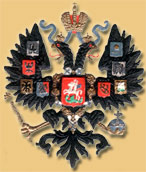 The
tragedy of Nicholas II, the Last Imperial Ruler of Russia, was
that he appeared in the wrong place in history. Equipped by
education to rule in the nineteenth century, where the world
seemed orderly, and equipped by temperament to be a constitutional
monarch, where a sovereign needed only be a good man in order
to be a good king. He lived and reigned in a transforming Russia
of the early twentieth century. The
tragedy of Nicholas II, the Last Imperial Ruler of Russia, was
that he appeared in the wrong place in history. Equipped by
education to rule in the nineteenth century, where the world
seemed orderly, and equipped by temperament to be a constitutional
monarch, where a sovereign needed only be a good man in order
to be a good king. He lived and reigned in a transforming Russia
of the early twentieth century.
The Emperor had the outstanding qualities of a man and
a ruler, but his favorite expression with regard to himself
in a close family circle was “I
am just a plain, common man.” He had an excellent
memory, exceptional energy and broad learning, a strong and
disciplined will power, an acute sense of morality, a great
awareness of his responsibilities. Devoted to his ideals, he
defended them with patience and persistence. Thoroughly honest,
he was a slave to his word and his loyalty towards the allies,
which was the reason of his death, proved it better than anything
else.
His instructions on the way to write an account of
the Russo-Japanese War were the following: “The
work must be based exclusively on bare facts … We have
nothing to hold back, as too much blood has already been shed.
Heroism deserves to be recorded along with defeats. We must
unfailingly strive to restore historical facts in their true
light.”
The Emperor was an implacable enemy of all the attempts
to idealize that which was unworthy; he himself spoke and
demanded nothing but the truth. Truth alone was what he looked
for everywhere.
|
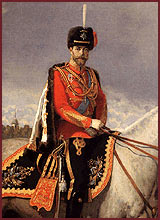 Although
Nicholas was the Tsesarevich, he had no desire to be the Tsar
and would have rather been "a farmer in England".
But, alas, he was to become the Tsar. Nicholas and his family's
fate were sealed. Although
Nicholas was the Tsesarevich, he had no desire to be the Tsar
and would have rather been "a farmer in England".
But, alas, he was to become the Tsar. Nicholas and his family's
fate were sealed.
It was a great misfortune for the Tsar Nicholas II and the Tsarina
Alexandra that they ascended the throne so young.
Growing up, Nickolas's father, Emperor Alexander III, did
not let him participate in his father's meeting with counclers,
which was a large mistake, for if Nicholas had been more active
in his father's life as a Tsar, he would not made so many mistakes
during his rule.
Nicholas II Alexandrovich Romanov (1868-1918) - last
Russian emperor, ruled from 1894 to 1917. Eldest son of Emperor
Alexander III (1845 - 1894) and Empress Maria Fedorovna (1847-1928).
He married (1894) a German Princess Alix Victoria Helene Luisa
Beatrice Hesse-Darmstadt (1872 - 1918) who, after converting
to Russian Orthodoxy, became Alexandra Fedorovna or Alix. |
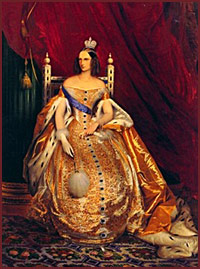 Prior to her confirmation, Alexandra had to go through
a great moral struggle, when, loving the Tsarevich Nicholas,
and knowing that she was loved by him, she also knew that to
marry him she had to embrace the Orthodox faith.
Prior to her confirmation, Alexandra had to go through
a great moral struggle, when, loving the Tsarevich Nicholas,
and knowing that she was loved by him, she also knew that to
marry him she had to embrace the Orthodox faith.
German by birth, English by upbringing, Protestant by
her father’s faith, she became a true Russian with ever
fiber of her nature. She had a deep love for Russia and became
truly Orthodox in spirit, in thought, and in actions in the
services, very similar to those performed by religious peasant
women.
After the birth of her first child, the Empress gave
all her attention to her children; she personally fed them,
bathed them, selected their nurses and was constantly in the
nursery, not trusting them with anyone. She would spend hours
in the classroom, directing their studies. It often happened
that while discussing important questions regarding a new charitable
organization, she would be holding her baby in her arms, or
while signing some business documents she would be rocking a
baby’s cradle. In her free moments she was always engaged
in some work such as embroidering, knitting, or painting.
The Grand Duchesses, were also busy, always occupied
with some activity. Wonderful works and embroideries came
from their nimble little hands. The two oldest daughters,
Olga and Tatiana, worked together with their mother in their
military hospitals during the World War l. Working as common
Red Cross nurses, they changed the dressing of wounded men.
|

|
The Royal Wedding
One week prior the royal wedding of Nicholas and
Alexandra, Emperor Alexander III, Nicholas's father, died.
The Imperial Family all assembled at St.
Petersburg to meet the funeral train, and Princess Alix's
first entrance into her future capital was in a weary funeral
procession.
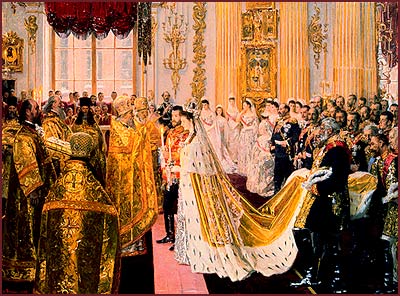
Princess Alix was dressed for her wedding in the Malachite
drawing-room of the Winter Palace.
Her hair was done in the traditional long side curls, in front
of the famous gold mirror of the Empress Anna Ioannovna, before
which every Russian Grand Duchess dresses on her wedding day.
The chief dressers of the ladies of the Imperial Family assisted,
and handed the crown jewels, which
lay on red velvet cushions. She wore numerous splendid diamond
ornaments and her dress was a heavy Russian Court dress of
real silver tissue, with an immensely long train edged with
ermine. The train was so heavy that, when it was not carried
by the chamberlains, she was almost pinned to the ground by
its weight.
The Emperor's marriage had been arranged so suddenly
that no preparations had been made for the young couple. No
festivities of any kind followed the marriage ceremony. It
took place in the morning, and immediately afterwards the
young Imperial couple drove to the Anichkov Palace, enthusiastically
cheered by the huge crowds which lined their route.
|
|
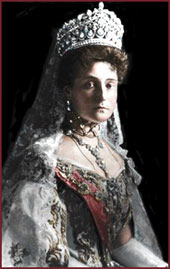 Letter
from Empress Alexandra to her sister. Letter
from Empress Alexandra to her sister.
Anichkov Palace,
December 10th, 1894.
"The ceremony in church reminded me so much of '84,
only both our fathers were missing - that was fearful-no kiss,
no blessing from either. But I cannot speak about that day
nor of all the sad ceremonies before. One's feelings you can
imagine. One day in deepest mourning, lamenting a beloved
one, the next in smartest clothes being married. There cannot
be a greater contrast, but it drew us more together, if possible...
If I only could find words to tell you of my happiness daily
it grows more and my love greater. Never can I thank God enough
for having given me such a treasure. He is too good, dear,
loving and kind, and his affection for his mother is touching,
and how he looks after her, so quietly and tenderly."
The Empress's character was very complex. Love for
her husband and children was its dominant trait. She was an
ideal wife and mother; her worst enemies could not deny her
this. She was not always logically reasonable when it was
a case of conflict between reason and affection. Her intellect
was always subordinate to her heart. In her dealings with
other people, her idealism often made her find in them the
good that her own nature led her to expect. Her inherent shyness,
which she was never able to conquer, was misunderstood and
considered pride.
The Emperor Nicholas and the Empress Alexandra were
everything to each other, and their devotion lasted all their
lives. Their natures were very different, but they had grown
into harmony with each other till they had reached that perfection
of understanding in which the tastes and habits of the one
are a development and continuation of those of the other.
The Empress had the stronger character, and in matters concerning
the Household or the children's education, which the Emperor
left in her hands, her wishes were law. If anyone referred
such questions to the Emperor, he always said "It is
as Her Majesty desires." He believed in her intuitive
good sense and depended on her judgment.
|
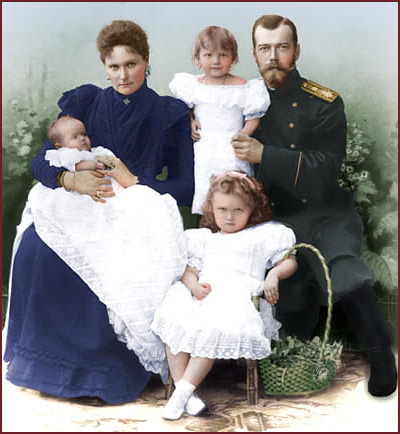 |

|
Letters from Tzar Nicholas II
to his wife Alexandra
Telegram, Novoborissov, 21 September, 1914.
"Sincere thanks for dear letter.
Hope you slept and feel well. Rainy, cold weather. In thought
and prayer I am with you and the children. How is the little
one? Tender kisses for all. Nicky."
Letter, Stavka, 5 April, 1915.
"MY BELOVED SUNNY,
I thank you from the depth of my old loving heart for your
two charming letters, the telegram and the flowers. I was
so touched by them. I was feeling so sad and downhearted,
leaving you not quite well, and remained in that state until
I fell asleep... Nicky."
Letter, Stavka, 31 March, 1916.
" MY BELOVED SUNNY,
At last I have snatched a minute to sit down and write to
you after a five days' silence - a letter is a substitute
for conversation, not like telegrams.
I thank you tenderly for your dear letters - your first
seems to have come so long ago! What joy it is to get several
in one day, (as I did) on the way, coming home!
During the journey I read from morning till night - first
of all I finished "The Man who was Dead," then
a French book, and to-day a charming tale about little Boy
Blue! I like it... I had to resort to my handkerchief several
times. I like to re-read some of the parts separately, although
I know them practically by heart. I find them so pretty
and true! ....
Now, my angel, my tender darling. I must finish. May God
bless you and the children! I kiss you and them fondly.
Eternally your old hubby NICKY."
Letter, Stavka. 23 February, 1917
" MY BELOVED SUNNY,
I read your letters with avidity before going off to sleep.
It was a great comfort to me in my loneliness, after spending
two months together. If I could not hear your sweet voice,
at least I could console myself with these lines of your
tender love... - The day was sunny and cold and I was met
by the usual public (people), with Alexeiev at the head.
He is really looking very well, and on his face there is
a calm expression, such as I have not seen for a long time.
We had a good talk together for about half an hour. After
that I put my room in order and got your telegram telling
me of Olga and Baby having measles. I could not believe
my eyes - this news was so unexpected. In any case, it is
very tiresome and disturbing for you, my darling. Perhaps
you will cease to receive so many people? You have a legitimate
excuse - fear of transmitting the infection to their families...
The stillness round here depresses me, of course, when I
am not working...I am sending you and Alexey Orders from
the King and Queen of the Belgians in memory of the war.
You had better thank her yourself. He will be so pleased
with a new little cross! May God keep you, my joy... NICKY.
|

|
|
The Royal jubilee
The year 1913 was the jubilee of the Romanov dynasty,
when the completion of three hundred years of monarchy was
celebrated with great rejoicings.
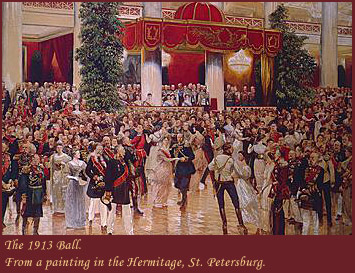
Expressions of fealty reached the Imperial Family from
every part of the country. It seemed scarcely possible that
the people who hailed the Revolution
with enthusiasm four years later could have moved such addresses
of loyalty and taken part in such celebrations.

|
|

Emperor Nicholas II, last Emperor of
Russia. |

|
Rasputin and Tsarevitch Alexei
If the riddle of the blood disorder that helped bring
down Russia's Imperial Empire is to be solved, we must first
find the truth about a holy man's influence on the lives of
an Empress and her son. History has recorded that Grigory Rasputin,
possessed mysterious powers of healing that could stop the bleeding
episodes of Alexei, the only son and heir of Tsar Nicholas II.
|
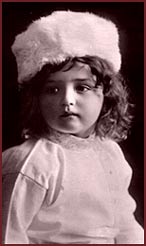 In
the summer of 1904, the long-awaited heir to the throne was
born. He became the center of the family, the favorite. Alexei
was an exceptionally handsome boy, the most wonderful child
anyone could hope for. But alas, when he was two months old
the Empress discovered that he was afflicted with hemophilia,
a hereditary disease of the House of Hesse, now transmitted
tragically to him, the long awaited heir. In
the summer of 1904, the long-awaited heir to the throne was
born. He became the center of the family, the favorite. Alexei
was an exceptionally handsome boy, the most wonderful child
anyone could hope for. But alas, when he was two months old
the Empress discovered that he was afflicted with hemophilia,
a hereditary disease of the House of Hesse, now transmitted
tragically to him, the long awaited heir.
The Empress suffered agony, blaming herself to be responsible
for his condition. Alexandra's shame of this may have been one
of the factors why she turned to the uncouth holy man Gregory
Rasputin.
The entire story of Tsar Nicholas II and his Empress
Alexandra centres on the Spala episode of October 1912 when
their son Alexei appeared to be on the brink of death.
The Emperor wrote to his mother: “The
days from the 10th to the 23rd were the worst. The poor child
suffered greatly; the pain was sporadic, occurring every 15
minutes. He hardly slept at all, did not have the strength to
cry but only moaned, repeating the same words all over again:
“Lord have mercy on me.” I could not stand it but
had to remain in the room in order to relieve Alix who had exhausted
herself completely, spending every night at his bedside. She
bore this trial better than I, especially when Alexis’
sufferings were at their worst.”
|
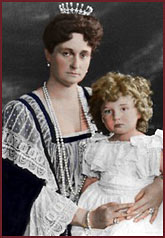 One
can only imagine how the parents suffered. An eye witness of
Alexei’s illness write: “The
crown-prince lay in bed, and moaned pitiably, pressing his head
to his mother’s hand, his fine face bloodless, unrecognizable.
From time to time he stopped moaning to whisper only one word:
“Mama,” in which he expressed all his suffering, all
his heart-break. And the mother would kiss his hair, his forehead,
his eyes, as if by this caress she could lighten his pain, breathe
into him some of that life which was leaving him.” One
can only imagine how the parents suffered. An eye witness of
Alexei’s illness write: “The
crown-prince lay in bed, and moaned pitiably, pressing his head
to his mother’s hand, his fine face bloodless, unrecognizable.
From time to time he stopped moaning to whisper only one word:
“Mama,” in which he expressed all his suffering, all
his heart-break. And the mother would kiss his hair, his forehead,
his eyes, as if by this caress she could lighten his pain, breathe
into him some of that life which was leaving him.”
For a week and a half the boy displayed symptoms of pallor,
internal haemorrhaging, abdominal swelling, pain and bleeding
in the joints, delirium, and dangerously high fever, but he
suddenly began to recover after the arrival of a telegram sent
by Rasputin to the Empress Alexandra.
|
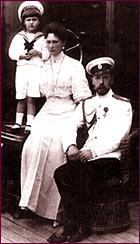 All
sorts of theories, from a reduction of stress and blood pressure
to claims of hypnosis, have been used in attempts to explain
how the words of a simple telegram could cure an eight year
old boy believed to have been dying from haemophilia. All
sorts of theories, from a reduction of stress and blood pressure
to claims of hypnosis, have been used in attempts to explain
how the words of a simple telegram could cure an eight year
old boy believed to have been dying from haemophilia.
Surrounded by doctors and advisors all predicting the
worst, only Rasputin gave her hope and reason to believe things
could get better. He did not heal Alexei's disease as historians
have suggested, but Rasputin did heal Alexandra's faith and
her belief that there could be a brighter future for her son.
Some say that it is incredible that the Empress of Russia
could pin her faith to such a person.
The appearance of such a personage in the precincts of
the Palace was bound to make a stir. The Emperor and Empress
had by this time realised that anyone to whom they showed any
special mark of favour would be immediately pecked at and intrigued
against. They imagined that this was the cause of the feeling
against Rasputin. When rumours against him were reported to
the Empress, she supposed them to be due to jealousy and class
prejudice.
|
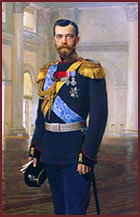 There
was something in the Emperor, simple as he was, that made any
familiarity in his presence unthinkable; but Rasputin kept his
gruff way of speech and spoke as authoritatively to the Emperor
as he would have spoken to a commoner. There
was something in the Emperor, simple as he was, that made any
familiarity in his presence unthinkable; but Rasputin kept his
gruff way of speech and spoke as authoritatively to the Emperor
as he would have spoken to a commoner.
The Empress saw Rasputin solely with religious eyes,
neither the uncouth peasant, nor the man, but the helping spirit
sent in her hour of need. She trusted, from the first, that
his prayers might cure her son. She, who disliked all publicity,
hid the fact of the child's illness.
In the case of Alexandra Fedorovna, mysticism was combined
with a blind clinging to anything that might save her child,
easily understood by some Russian minds, in whom religion is
curiously mixed with superstition.
|
 Hatred
for Rasputin, the man who was supposed to be responsible for
all the Government's mistakes became a real obsession. The feeling
against him became so intense that in 1916 a plot was formed
to murder him in order to save Russia. Hatred
for Rasputin, the man who was supposed to be responsible for
all the Government's mistakes became a real obsession. The feeling
against him became so intense that in 1916 a plot was formed
to murder him in order to save Russia.
Conspirators lured him to the Yusupov
Palace on the pretext that Prince Felix Yusupov would introduce
Rasputin to his beautiful wife.
Rasputin was first offered poisoned wine, the amateur
murderers not knowing that for the poison they chose alcohol
is an antidote. Their victim survived what appeared to be a
deadly dose. Prince Yussupov and Purishkevich then took Rasputin
into an adjoining room and, as he was admiring an ancient crucifix,
shot him several times in the back. Rasputin's strong frame
resisted even this, and when Prince Yussupov -returned to remove
his body, he got up and staggered across the room. More shots
were fired, this time with effect. The body was taken in a car
and thrown into a hole made in the frozen Neva. The strength
of the current drove the body down under the ice, and it was
washed ashore some days later. Rasputin does not seem to have
been dead even when he was thrown into the water, for the cords
bound round his body were loosened, and his rigid hand was folded
as if making the sign of the cross. |
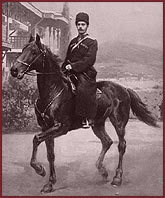 Nicholas
II Romanov ruled Russia from 1895 to 1917 and lost power during
Russia's February Revolution, when in the spring of 1917 he
had to abdicate. The power was transferred to the Provisional
Government, but shortly after that Nicholas Romanov and his
family were arrested and were kept under close surveillance
at the Alexander Palace in Tsarskoye Selo, near the Russian
capital Petrograd (now St. Petersburg).
Romanovs were then transported to inner Russia to prevent them
from running away abroad or from being captured by the approaching
German troops. Russia's last tzar and his family spent the last
months in Yekaterinburg. During their time in housearrest, the
family came yet closer and really didn't want leave Russia.
They saw it as their duty to stay, and as the empress said:
"If it is god's will, we must
endure it to the very end…" And so they
did… Nicholas
II Romanov ruled Russia from 1895 to 1917 and lost power during
Russia's February Revolution, when in the spring of 1917 he
had to abdicate. The power was transferred to the Provisional
Government, but shortly after that Nicholas Romanov and his
family were arrested and were kept under close surveillance
at the Alexander Palace in Tsarskoye Selo, near the Russian
capital Petrograd (now St. Petersburg).
Romanovs were then transported to inner Russia to prevent them
from running away abroad or from being captured by the approaching
German troops. Russia's last tzar and his family spent the last
months in Yekaterinburg. During their time in housearrest, the
family came yet closer and really didn't want leave Russia.
They saw it as their duty to stay, and as the empress said:
"If it is god's will, we must
endure it to the very end…" And so they
did…
|
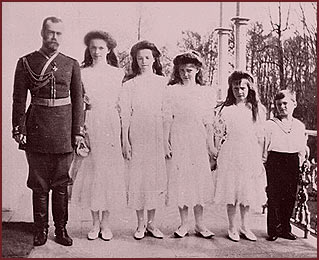
Nicholas with the kids. Picture was
taken by Alix.
Before leaving to Alexander
Palace in Tsarskoe Selo for house arrest, Emperor Nicholas
II insisted on taking leave of his troops by addressing to them
the following Order of the Day.
|

|
Last
Order of the Emperor Nicholas II.
8 (21) March, 1917. No. 371.

|
|
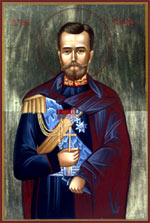 On
July 17, 1918 last imperial family of Russia was "executed"
on the orders of the local authorities and, allegedly, of
the Bolshevik leader Vladimir
Lenin. The bodies of Romanovs were then thrown into one
of abandoned mines. On
July 17, 1918 last imperial family of Russia was "executed"
on the orders of the local authorities and, allegedly, of
the Bolshevik leader Vladimir
Lenin. The bodies of Romanovs were then thrown into one
of abandoned mines.
As a tsar, and even after he abdicated, Nicholas II was
the head of the Russian Orthodox Church. After the assassination,
he and his family were revered by many as martyrs and numerous
miracles were attributed to them. The family was canonized as
royal martyrs by the Russian Orthodox Church Abroad in 1981.
|
|


